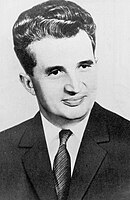
Photo from wikipedia
Funeral ceremonies for Communist leaders during the Cold War signaled the end of a particular era and the beginning of a new one. In the case of Romania, Gheorghe Gheorghiu-Dej's… Click to show full abstract
Funeral ceremonies for Communist leaders during the Cold War signaled the end of a particular era and the beginning of a new one. In the case of Romania, Gheorghe Gheorghiu-Dej's unexpected demise in March 1965 resulted in Nicolae Ceaușescu's spectacular rise to power and the beginning of a short lived de-Stalinization. Weeks after the former dictator's death, dramatic changes occurred within the top elite and in the interpretation of the Romanian Communist Party's history. Gheorghiu-Dej's name swiftly vanished from the official propaganda, and the new leader's cult of personality was born.
Journal Title: Journal of Cold War Studies
Year Published: 2017
Link to full text (if available)
Share on Social Media: Sign Up to like & get
recommendations!